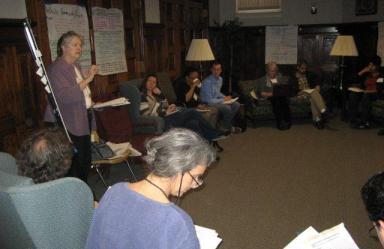FOOD JUSTICE–Theme Group Summary

The group identified 21 local organizations concerned with food justice and then focused quickly on goals:
-
Increase access to local food (information, geographic access, financial access)
-
Substitute local food products for those that are now imported
-
Let the needs of low income people drive the decisions and projects
-
Prioritize young people in the process
-
Include farmers in the conversations
They then asked what they needed to do to carry their efforts forward. These are some of the answers:
- A systems map to see where projects are in place and where strategies need to be developed around finances, market demand, distribution, job training, production facilities, and more
- Increase shared information and collaboration among projects
- Research what other communities have accomplished (Cuba as an example)
- Get information about acreage in the county: what’s available, what’s in production, how much do we need to feed everyone?
- Identify an ambitious goal common to all food-related projects
- Make demands on existing food businesses to use locally produced foods.
- The Occupy movement may call for a Second Constitutional Convention in July of 2012, with threat of/plans for a national strike in November 2012 if there is no redress. In preparation for a national strike, we should work to build capacity locally to feed ourselves (all local strikers) for two months
- Create neighborhood markets
- Increase transportation options
In their second session, this group identified 30 groups or individuals who were not included in their discussion and asked what it would take to have people who are marginalized drive the process of creating food justice.
- Help people feel like they deserve to have access to healthy affordable food, to be healthy. Strengthen people’s cultural identity and personal power.
- Solve the digital divide
- Build connections and relationships face to face (without the internet)
- Go to where people are, rather than asking them to come to us
- Confront issues around equity and call on our allies (across race and class)
- Include marginalized people in leadership
- Create spaces where kids can come together and talk, interact, listen.
- Build skills– how to use tools, to know one’s strengths, to use the resources and skills in the community
- Plan for our own replacement as leaders, nurture new leaders, create circles of engagement
- Commit to redistribution of land, jobs, resources
- As researchers, stop placing the “problem” we are researching in the community, and the “solution” in ourselves
- See organizations as webs, not hierarchies
Some habits to break and make?
- Stop flying solo,
- learn to speak up,
- connect with rural communities,
- refuse to take “no” for an answer,
- make purchasing choices based on relationships,
- stop limiting ourselves in what we believe is possible and
- always notice who’s missing from the dialogue.
Some themes that recurred in this group’s discussions were:
- the need for research, the critical issue of access,
- the lack of a central organization or hub to bring their efforts together.
By the end of day 2, many of them participated in the Whole Community Project discussion and offered that as a potential centralizing organization.
For more information please contact Jemila Sequeira ( jemila.sequeira@gmail.com) at the Whole Community Project (607-272-2292, ext. 157).